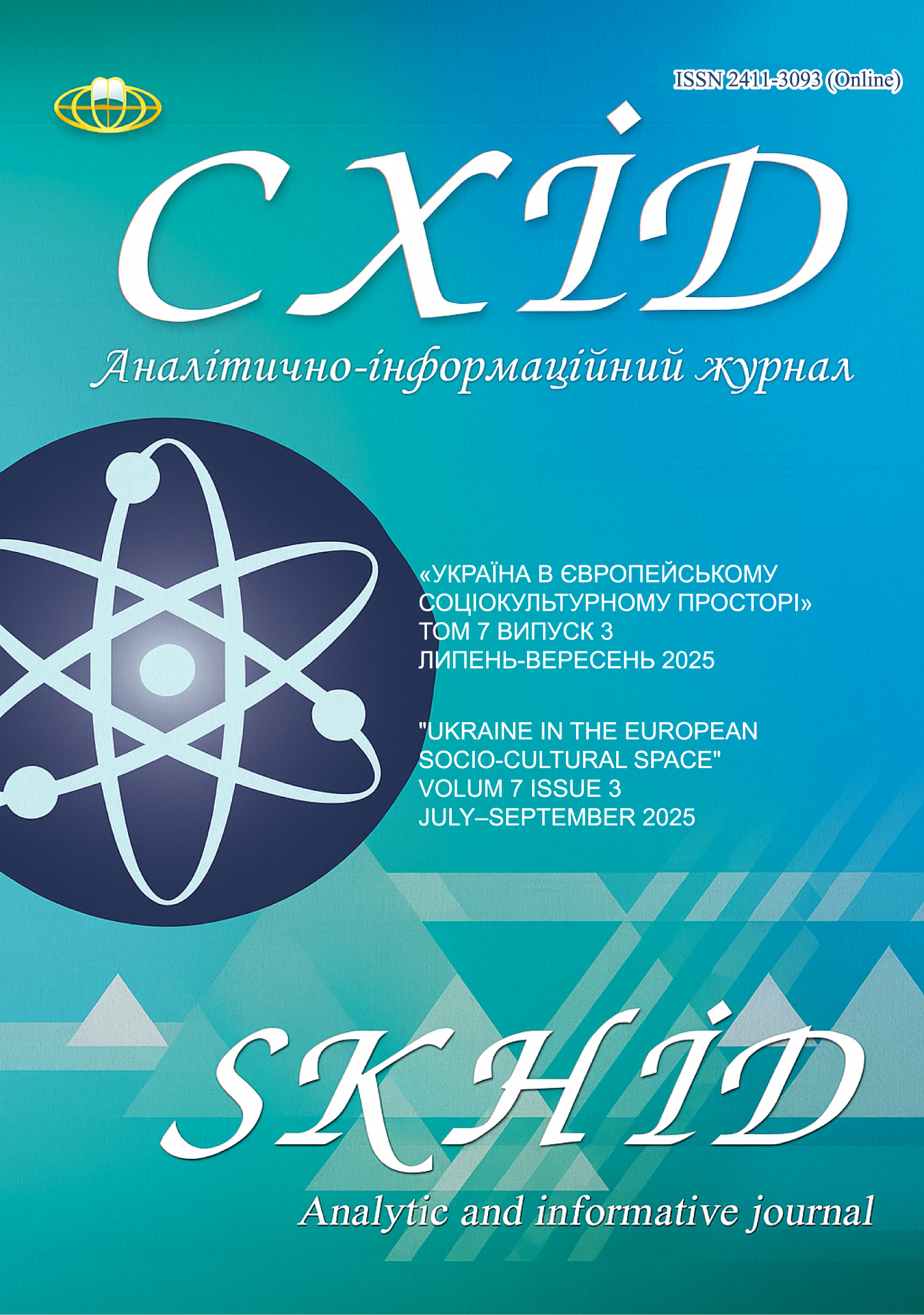The Harmony between Ukrainian and European Values
DOI:
https://doi.org/10.21847/2411-3093.2025.737Keywords:
value, system of values, Europe, Ukraine, intercultural communicationAbstract
This article is devoted to the problem of comparing Ukraine's national values with European values. According to the Law of Ukraine “On National Security”, Ukraine's national security is defined as “the protection of state sovereignty, territorial integrity, democratic constitutional order, and other national interests of Ukraine from real and potential threats”. Experts rightly criticise this definition for being incomplete, since national values are no less important than interests. Values are also not mentioned in the Law of Ukraine “On the Basic Principles of State Policy in the Sphere of Establishing Ukrainian National and Civic Identity”. However, interests need to be complemented by values, as national interests in today's world can change rapidly under the influence of external and internal circumstances, while values are a stable foundation for statehood. Ukraine's strategic orientation towards European integration involves comparing Ukrainian and European values as part and whole. The basis of this process is a dialogue between European and Ukrainian cultural values. The system of values is revealed: a meaningful life, a vital system, an interactional, and a socializational system. To the usual complex of European values, such as freedom, democracy, and equality, others are added: "inner world", "deep respect for ordinary life", "self-fulfillment", as well as "freedom", "acceptable difference" and "practical rationalism of world domination". Among the Ukrainian values, the following are being analyzed: "desire for Order", "heartiness and sincerity", "freedom", "a feeling of a special connection with the environment", "a feeling of involvement in the affairs of other people", "the ability to overcome geopolitical traumas". Ukrainian cultural values are an open system, complemented by other components. Demonstrating the similarity between Ukrainian and European values in the table, the author concludes that the similarity of cultures makes Ukraine an integral part of the European sociocultural space.
Downloads
References
Bondarets, M. (2018). Strategies for the dissemination of European values as an instrument of EU global policy. In: European cultural and historical values: retrospective and prospective. Kyiv, Institute of World History of the NAS of Ukraine. (In Ukrainian).
Borgholte, M. (2014). How Europe found its diversity? In: Cultural Values of Europe. Edited by Hans Joas and Klaus Wiegandt. Kyiv, Duh i Litera (In Ukrainian).
Joas, H. (ed.), Wiegandt, K. (ed.) (2014). Cultural Values of Europe Kyiv, Dukh i Litera (In Ukrainian).
Document on The European Identity published by the Nine Foreign Ministers on December 14, 1973, in Copenhagen https://www.cvce.eu/content/publication/1999/1/1/02798dc9-9c69-4b7d-b2c9-f03a8db7da32/publishable_¬en.pdf
Filipova, I. (2018). Value-semantic sphere of altruistic personality. In: Psychology. Values. Spirituality. Lutsk. (In Ukrainian).
Flash, K. (2014). The Value of the Inner World (Innerlich-keit). In: Cultural Values of Europe. Edited by Hans Joas and Klaus Wiegandt. Kyiv, Duh i Litera. (In Ukrainian).
Grabchak, K. (2024). Ukrainian ethnic values and values of Western civilization. Ukrainian Studies. No 4 (93), http://journal.ndiu.org.ua/article/view/317564 (In Ukrainian).
Identity of Ukrainian citizens: trends of change (June 2024). Razumkov Center. https://razumkov.org.ua/napriamky/sotsiologichni-doslidzhennia/identychnist-gromadian-ukrainy-tendentsii-zmin-cherven-2024r
Kisla, G. (2022). Intercultural communication as an ob-ject of scientific discourse. Intercultural communica-tion in the context of globalization dialogue: devel-opment strategies: materials of the II International Scientific and Practical Conference, November 25–26, Odessa. Part 1. Lviv, Toruń, Liha-Press. (In Ukrainian).
Menke, Ch. (2014). Inner Nature and Social Normativity. The Idea of Self-Realization. In: Cultural Values of Europe. Kyiv, Duh i Litera. (In Ukrainian).
Patterson, O. (2014). Freedom, Slavery and the Modern Construction of Rights. In: Cultural Values of Europe. Edited by Hans Joas and Klaus Wiegandt. Kyiv, Duh i Litera. (In Ukrainian).
Petrushenko, V. (2009). Explanatory Dictionary of Basic Philosophical Terms. Lviv, Publishing House of the National University "Lviv Polytechnic". (In Ukrainian).
Piren, M. (2016). European values – determinants of change in modern Ukraine. Kyiv, Druk. Art. (In Ukrainian).
Popovych, M. (2013). To be a Human Being. Kyiv. (In Ukrainian).
Reinhart, W. (2014). Asserting the Meaning of Everyday Life. In: Cultural Values of Europe. Edited by Hans Joas and Klaus Wiegandt. Kyiv, Duh i Litera. (In Ukrainian).
Schluchter, W. (2014). Rationality – a Specificity of Eu-rope? In: In: Cultural Values of Europe. Kyiv, Duh i Litera. (In Ukrainian).
Spiritual Values of the Ukrainian People (1999). Kyiv, Ivano-Frankivsk, Play. (In Ukrainian).
Sulyatitska, T. (2013). Intercultural interaction in the information society: communicative aspect. Kamianets-Podilskyi, PP "Medobory-2006". (In Ukrainian).
Turpak, N. (2024). Axiological principles of establishing the geopolitical subjectivity of Ukraine. In: Geopolitical subjectivity of Ukraine in the context of global challenges. Kyiv, Research Institute of Ukrainian Studies of Taras Shevchenko National University of Kyiv. (In Ukrainian).
Vaida, T. (2022). European values as a legal basis for intercultural communication of the Ukrainian people in the multinational population of the European Union. Intercultural communication in the context of globalization dialogue: development strategies. Materials of the II International Scientific and Practical Conference, November 25–26, Odessa. Part 1. Lviv, Toruń, Liha-Press. (In Ukrainian).
Downloads
Published
How to Cite
Issue
Section
License
Copyright (c) 2025 Віра Додонова

This work is licensed under a Creative Commons Attribution-NonCommercial-NoDerivatives 4.0 International License.
1. Authors bear responsibility for the accuracy of facts, quotations, numbers and names used.
2. Manuscripts are not sent back.
3. The publisher does not always agree with the authors' opinion.
4. The authors reserve the right to authorship of the work and pass the first publication right of this work to the journal under the terms of a Creative Commons Attribution-NonCommercial-NoDerivatives 4.0 International License. This license allows others to distribute (copy) the published work for non-commercial purposes, provided there is mandatory attribution to its authors and a link to the first publication in our journal.
5. The authors have the right to conclude separate supplement agreements that relate to non-exclusive work distribution in the form in which it has been published by the journal (for example, to upload the work to the online storage of the journal or publish it as part of a monograph), provided that the reference to the first publication of the work in this journal is included.

